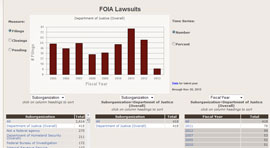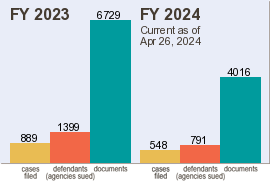JUDICIAL WATCH, INC. v. U.S. DEPARTMENT OF HOMELAND SECURITY and 12 other new FOIA lawsuits
We have added 65 documents from 13 FOIA cases filed between May 22, 2016 and May 28, 2016. Note that there can be delays between the date a case is filed and when it shows up on PACER. If there are filings from this period that have yet to be posted on PACER, this FOIA Project list may not be complete.
Click on a case title below to view details for that case, including links to the associated docket and complaint documents.
- JUDICIAL WATCH, INC. v. U.S. DEPARTMENT OF HOMELAND SECURITY (filed May 23, 2016)
Judicial Watch submitted a FOIA request to the Department of Homeland Security for emails sent or received by Secretary of Homeland Security Jeh Johnson and several other high-ranking officials using non-government email addresses. The agency acknowledged receipt of the request and told Judicial Watch it could not search for non-government-generated emails. The agency indicated it would close Judicial Watch’s request if it did not hear back from the organization within 30 days. The agency later provided a final response that indicated that it could only search for government-generated emails and it would need some kind of subject matter with keywords in order to conduct a search. The letter did not provide notice of Judicial Watch’s right to appeal. After hearing nothing further from the agency, Judicial Watch filed suit.
Issues: Adequacy – Search, Failure to respond within statutory time limit, Litigation – Attorney’s fees, Litigation – Vaughn index - GARZA v. UNITED STATES MARSHAL SERVICE (filed May 24, 2016)
Jorge Luis Garza submitted a FOIA request to the U.S. Marshals Service for records concerning a probation violation that was the basis of his detention and potential deportation to Colombia. The agency responded by disclosing 77 pages. Garza believed none of the pages responded to his request and filed an appeal with the Office of Information Policy. OIP upheld the Marshal Service’s response and Garza filed suit.
Issues: Adequacy – Search - GARZA v. FEDERAL BUREAU OF INVESTIGATION (filed May 24, 2016)
Jorge Luis Garza submitted a FOIA request to the FBI for records concerning his probation violation. The agency denied the request under Exemption 7 (law enforcement records). Garza filed an appeal with the Office of Information Policy, which upheld the agency’s denial. Garza then filed suit.
Issues: Exemption 7 – Law enforcement records - GARZA v. UNITED STATES DRUG ENFORCEMENT AGENCY (filed May 24, 2016)
Jorge Luis Garza submitted a FOIA request to the DEA for records concerning his probation violation. The agency found nine pages. Before DEA had finished processing his request, Garza filed an administrative appeal with the Office of Information Policy, which remanded the case back to DEA for further processing. DEA then denied access to the nine pages under Exemption 7 (law enforcement records). Garza then filed suit.
Issues: Exemption 7 – Law enforcement records - SANDOVAL v. U.S. DEPARTMENT OF JUSTICE et al (filed May 26, 2016)
Marcelo Sandoval, a federal prisoner, submitted a FOIA request to the Department of Justice for records concerning his conviction on kidnapping. The agency withheld records under Exemption 7 (law enforcement records). Sandoval indicates that he has exhausted his administrative remedies, but doesn’t state that he filed an appeal. Nevertheless, he ultimately filed suit.
Issues: Exemption 7 – Law enforcement records - Rosiere v. United States of America (filed May 23, 2016)
Shaun Rosiere, a federal prisoner, submitted a FOIA request to the Department of Justice for records concerning his criminal prosecution. After the agency failed to respond, Rosiere filed suit.
Issues: Failure to respond within statutory time limit - Rosiere v. USA (filed May 23, 2016)
Shaun Rosiere, a federal prisoner, submitted a FOIA request to the Department of Justice for records concerning his criminal prosecution. After the agency failed to respond, Rosiere filed suit.
Issues: Failure to respond within statutory time limit - Rosiere v. United States of America (filed May 23, 2016)
Shaun Rosiere submitted a FOIA request to the Department of Justice for records concerning his conviction. After the agency failed to respond, Rosiere filed suit.
Issues: Failure to respond within statutory time limit - Rosiere v. United States of America (filed May 23, 2016)
Shaun Rosiere submitted a FOIA request to the Department of Justice for records concerning his conviction. After the agency failed to respond, Rosiere filed suit.
Issues: Failure to respond within statutory time limit - American Civil Liberties Union v. Department of Health and Human Services et al (filed May 24, 2016)
The ACLU submitted a FOIA request to the Centers for Medicare and Medicaid Services for records concerning complaints to the agency about Catholic hospitals. CMS provided 150 pages. The ACLU appealed, arguing that the search was inadequate because it produced so few records. After hearing nothing further from the agency, the ACLU filed suit.
Issues: Failure to respond within statutory time limit, Litigation – Attorney’s fees, Public Interest Fee Waiver - FREEDOM WATCH, INC. v. BUREAU OF LAND MANAGEMENT et al (filed May 25, 2016)
Freedom Watch submitted FOIA requests to the Bureau of Land Management and the Department of Justice for records concerning a confrontation between government agents and rancher Cliven Bundy in Clark County, Nevada. Freedom Watch requested expedited processing and a fee waiver. After hearing nothing from either agency, Freedom Watch filed suit.
Issues: Adequacy – Search, Failure to respond within statutory time limit, Litigation – Attorney’s fees, Litigation – Vaughn index - Chelmowski v. Federal Communication Commission (filed May 25, 2016)
James Chelmowski submitted three FOIA requests to the Federal Communications Commission for records concerning his informal complaint to the agency pertaining to AT&T. Chelmowski had some back and forth with the agency and the agency ultimately provided a response. Chemowski was dissatisfied and apparently appealed. Still dissatisfied, he complained to the Office of Government Information Services. OGIS eventually told Chelmowski that the FCC had declined to participate in mediation. Chelmowski then filed suit.
Issues: Adequacy – Search, Litigation – Attorney’s fees, Litigation – Vaughn index - Graves, Dougherty, Hearon & Moody, P.C. v. United States Department of the Army (filed May 27, 2016)
The law firm of Graves, Dougherty, Hearon & Moody submitted FOIA requests to the Department of the Army for records concerning bids and contracts awarded to Avteq Group Competitor, a competitor of the law firm’s client, University Loft. The agency responded to the requests by redacting certain pricing information under Exemption 4 (confidential business information) and withholding information about unsuccessful bids altogether under Exemption 3 (other statutes). The law firm attempted to structure FOIA requests in such a way as to learn the identities of unsuccessful bidders, but after failing to do so, the law firm filed suit.
Issues: Exemption 3 – Statutory prohibition of disclosure, Exemption 4 – Confidential business information, Litigation – Attorney’s fees, Litigation – In camera review
No comments yet
 Recent Tweets
Recent Tweets


